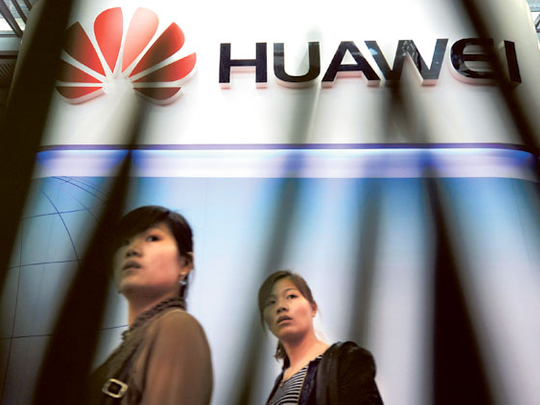
Washington/Hong Kong: China’s top telecoms gear makers should be shut out of the US market as potential Chinese state influence on them poses a security threat, the US House of Representatives’ Intelligence Committee said in a draft of a report to be released on Monday.
US intelligence must stay focused on efforts by Huawei Technologies and ZTE to expand in the United States, and tell the private sector as much as possible about the purported espionage threat, the panel leaders said, based on their 11-month investigation of the two firms.
Employee-owned and unlisted Huawei is the world’s second-biggest maker of routers, switches and telecoms equipment by revenue after Sweden’s Ericsson. ZTE ranks fifth.
In the global mobile phone sector, ZTE is fourth and Huawei sixth.
Huawei generated around 4 per cent of its group sales from the United States, while ZTE’s US revenues made up 2-3 per cent of its overall figure. The bulk of both companies’ US sales comes from selling handsets through US carriers such as Verizon, Sprint and T-Mobile USA.
“The impact will be quite limited if the report is referring just to telecoms equipment, but it’s another story if handsets are included as well,” said Huang Leping, an analyst at Nomura Securities.
“Huawei and ZTE handsets have been consistently gaining market share in the United States.”
In the US handsets market where Apple and Samsung dominate, ZTE ranks sixth and Huawei eighth, according to industry figures.
Political distraction
The broadside comes as Huawei mulls a possible initial public offering, sources said, as part of its efforts to allay suspicions that have all but blocked its US ambitions, including business tie-ups.
Huawei has been looking at the listing issue for years, but there has been little progress due to its complicated share structure and whether a listing would actually help, given that US lawmakers remain suspicious of ZTE even though it’s a listed company, analysts said.
Huawei spokesman William Plummer rejected the committee’s allegations in a statement emailed to Reuters.
“Baseless suggestions otherwise or purporting that Huawei is somehow uniquely vulnerable to cyber mischief ignore technical and commercial realities, recklessly threaten American jobs and innovation, do nothing to protect national security, and should be exposed as dangerous political distractions from legitimate public-private initiatives to address what are global and industry-wide cyber challenges,” he said.
For its part, ZTE released a copy of the letter on Monday it sent to the committee after a hearing in September, stating it “profoundly disagrees” with the claim that it is directed or controlled by the Chinese government.
“ZTE should not be a focus of this investigation to the exclusion of the much larger Western vendors,” it said.
Chinese foreign ministry spokesman Hong Lei urged the United States to “set aside prejudices” when it deals with Huawei and ZTE. “Chinese telecoms companies have been developing their international business based on market economy principles.
Their investment in the United States embodies the mutually beneficial nature of Sino-American economic and trade relations,” he said at a briefing in Beijing.
“We hope the US Congress will set aside prejudices and respect the facts, and also do more that is beneficial to Sino-American economic and trade ties, rather than the contrary.”
ZTE’s Hong Kong-listed shares fell more than 5.5 per cent on Monday, on track for their biggest one-day drop in more than a month. The benchmark index was down 0.9 per cent.
The US panel’s draft report faulted both Huawei and ZTE for failing to satisfy its requests for documents, including detailed information about formal relationships or regulatory interaction with Chinese authorities.
US companies thinking about buying from Huawei should “find another vendor if you care about your intellectual property; if you care about your consumers’ privacy and you care about the national security of the United States of America,” panel chairman Mike Rogers said in comments broadcast late on Sunday on the CBS News programme 60 Minutes.
Rogers and the committee’s top Democrat, C.A. Ruppersberger, have scheduled a 10am Eastern time (1400 GMT) news conference to release the final, unclassified version of their report. The publication comes a month ahead of US presidential elections where China — and its impact on US jobs — has been a campaign issue.
Credible allegations
The panel said it received credible allegations from unnamed industry experts and current and former Huawei employees suggesting Huawei, in particular, may be guilty of bribery and corruption, discriminatory behaviour and copyright infringement.
The committee plans to refer such allegations to the US Justice Department and Department of Homeland Security, according to the draft made available to Reuters.
“US network providers and system developers are strongly encouraged to seek other vendors for their projects,” it said.
The document cited what it called long-term security risks supposedly linked with the companies’ equipment and services. But it did not provide detailed evidence, at least not in an unclassified version. A classified annex provides “significantly more information adding to the committee’s concerns,” the draft said.
Based on classified and unclassified information, Huawei and ZTE, which are both based in Shenzhen, China, “cannot be trusted to be free of foreign state influence and thus pose a security threat to the United States and to our systems,” the document said.
Huawei and ZTE are rapidly becoming “dominant global players” in the telecommunications market, which is intertwined with computerised controls for electric power grids; banking and finance systems; gas, oil and water systems and rail and shipping, it noted.
ZTE’s US telecoms infrastructure equipment sales last year were less than $30 million. In contrast, two of the larger Western vendors alone had combined U.S. sales that topped $14 billion,
ZTE told the committee in its Sept. 25 letter, an apparent reference to Finland-based Nokia Siemens Networks and Paris-based Alcatel Lucent.
“It seems self-evident that the universe of companies examined by the Committee is so small as to omit most of the equipment actually employed in the US telecom infrastructure system,” the letter said.










